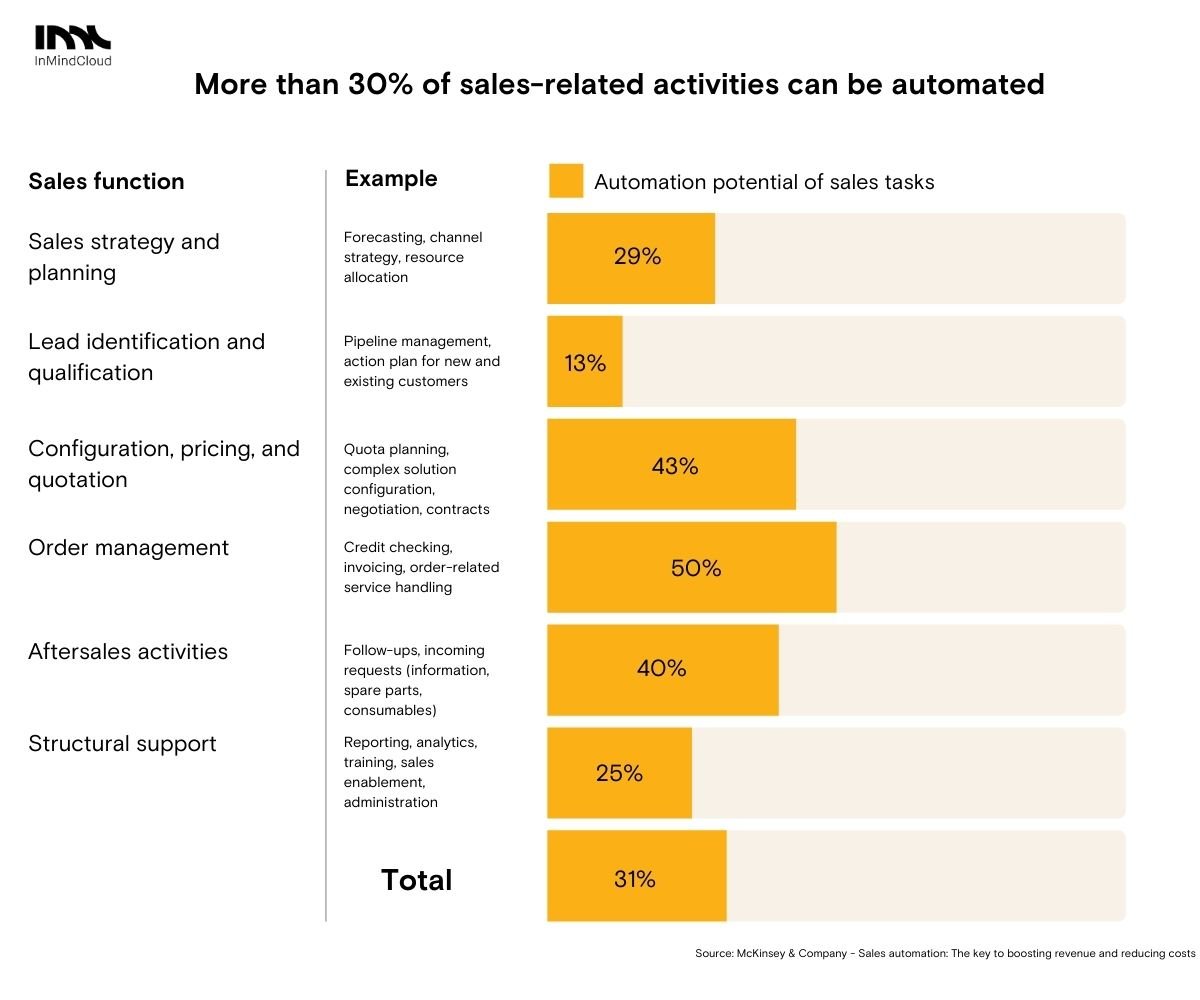Cost reduction is an exercise that every manufacturing company encounters. But in the current economy, it plays a vital role in your company's recovery.
Manufacturers are now finding new ways to optimize their businesses and lower costs. Besides transforming the production process, manufacturers can also put the spotlight on their sales process.
Using digital solutions to improve how your manufacturing business sells requires a deep understanding of how it works. Download our Manufacturing Sales Handbook to quickly get up to speed!
That's because the traditional sales process hasn't caught up with other parts of a manufacturer's business. As a result, your sales team only spends about a third of their time actually selling.
.jpg?width=1200&name=How%20digital%20lowers%20manufacturing%20costs%20of%20sales%20(1).jpg)
Digitize sales knowledge to lower costs
In the manufacturing industry, sales reps are spending their time on miscellaneous things. It can be restarting stalled deals, answering simple customer queries, traditional reporting, or manually tracking sales progress.
The most time-consuming task, however, is also the most critical to winning deals. Your sales reps spend a large part of their time collaborating with various parts of the organization—from engineering to sales ops—to create quotations and proposals that make customers happy while preserving precious margins.
It requires a considerable number of man-hours to get the numbers from Excel sheets and ensure they are right.
This process may be the norm, but manufacturers are right to question it: Is the entire process set up to be efficient? Should your sales reps be focusing on adding value for your customers? Or making sure your complex solutions match requirements and are the most competitive?
Without a strategic overhaul to the entire process, your sales challenges, including a long sales cycle and frustrated customers, can pile up.
Reimagine the entire sales process
Many of our customers have begun to recognize this problem and are actively trying to resolve it. The first step is to completely reimagine the sales process from the customers' perspective. It helps your sales organization meet customers at every touchpoint and deliver to their evolving needs.
Next comes the digitalization of this new sales process. At the foundation of your digital sales process is your most crucial manufacturing knowledge and product expertise.
With the help of intelligent automation, it can be readily available so that experienced sales reps can be more efficient, and new additions to the team can start selling right away.
According to a study by McKinsey, almost a third of routine or time-consuming tasks can be automated using digital technology.
Early adopters of sales digitalization reported an increase in:
- Customer-facing time
- Customer satisfaction
- Efficiency of up to 15%
- Sales uplift potential of up to 10%.

How a digitalized sales process lowers costs
The traditional manufacturing sales process is incredibly complex. This often leads to a sales cycle that is longer than your customers are ready to accept. Every step you take to meet the customers where they are, requires time and resources that add to the total cost of sales.
But with intelligent digital sales, your sales cycle can be shortened to just a few steps. Here is a breakdown of how manufacturers can optimize each stage of the sales process to be much faster and more cost-efficient with a digital solution built for manufacturing.
Quotation and order management
The quotation stage is where customers decide on which manufacturer to work with. Speed and accuracy are of the essence.
Manufacturer challenges
- Manual data extraction from ERP
- Manual complex solution configuration
- Manual administrative tasks
- Multiple layers of approvals
- Collaboration needs with all stakeholders
- Manual calculations (and re-calculations)
- Inaccuracies that lead to several corrections and associated costs
How a Digital Sales Platform helps
- Fast and viable configuration using real-time ERP data
- Automation of manual administrative tasks
- Automated approval workflows
- Organized collaboration with all stakeholders
- Highly accurate cost, pricing, inventory data
- Automatically calculated margins and discounts for various simulations
Customer and collaboration management
After your customers come on board, it takes tremendous effort and resources to keep them happy—and spending. Customer retention costs can add up over time. Proactively matching their needs requires transparency and efficiency.
Manufacturer challenges
- No visibility into customer order history, requirements, or buying preferences
- Outdated communication channels (e.g., fax, calls via customer service hotline, etc.)
- Manual compilation of performance metrics can be slow and inaccurate
- Inaccuracy negatively impacts production forecasts, pipeline reports, and decision-making
- Lost opportunities due to lack of follow-up
- Disorganized sales activities and customer engagements
- Sales losing track of customers with long sales cycles
How a Digital Sales Platform helps
- Dashboard helps sales spot opportunities fast and focus on the right things
- Prioritize the most profitable deals instantly with opportunity scoring
- 360-degree visibility into all customer accounts, history, installed base, and ongoing engagements
- Always up-to-date account master data
- Instantly reach out to customers with just one click
- Make better business decisions with key metrics at your fingertips
- Integrated quote management helps generate offers in minutes
- Email integration makes customer interaction data instantly available and lets you act directly from Outlook or Gmail
- Intelligent discount calculation ensures the highest customer satisfaction with the best possible margins
Aftersales, online sales, and partner management
Your customers expect 24/7 access to your business. Offering online channels is a powerful way to ensure sales is constantly flowing. Customers and partners can easily find the product information they need and kickstart the sales process on their own.
Manufacturer challenges
- Siloed management of multiple sales channels
- Innovation takes weeks to arrive in the market
- Sales are bogged down by requests for information
- Aftersales uses up valuable resources of sales organization
- Currency exchange due to sales channels in other regions causes margin loss
- Outdated prices and product information in catalogs distributed to partners and dealers
- Large catalogs are hard to navigate for required products
How a Digital Sales Platform helps
- Manage all sales channels from a single platform
- Innovations can be instantly available and appropriately marketed for customers, partners, or distributors
- Interactive catalogs help customers or partners find and buy products fast
- Save on sales resources with self-service
- Solution configuration & inquiries
- Information gathering
- Spare parts & consumables buying
- Order status inquiries
- Intelligent recommendations automate cross-selling and up-selling
- Integrated customer and quote management capabilities take the entire customer journey online
Conclusion: A tool to supercharge efficiency and performance
A Digital Sales Platform can become an essential part of your manufacturing business. But that doesn't mean it replaces your sales force. It is a powerful tool that helps your sales team supercharge their efficiency and performance.
Lowering the cost of sales is a key factor for manufacturers. However, from a human perspective, the gains are much more significant.
Customers benefit from a streamlined buying process, while your sales reps can focus on what they do best—selling and delivering the extra value that your customers demand.
Download our Manufacturing Sales Handbook to assess all your risks and opportunities in the digital age of sales.

 Deutsch
Deutsch









